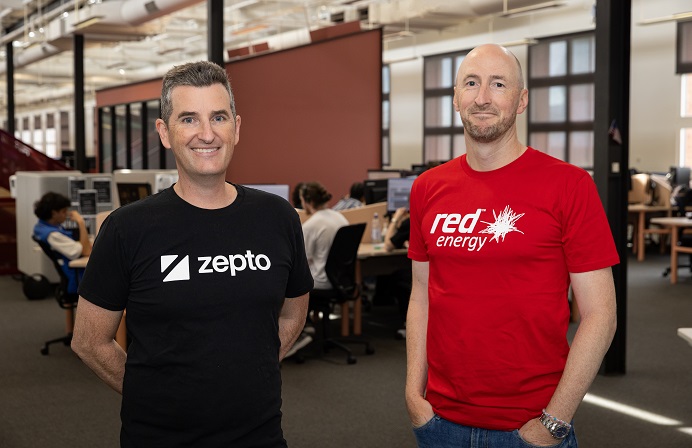
As part of a featured panel discussion at the 2022 Future of Financial Services, New Zealand conference, leading technologists from New Zealand’s financial services sector weighed in on the unique, and not-so-unique challenges facing local banks and insurers.
Speakers explored the tech talent crisis gripping the country and strategies for management to adapt and meet the needs of an increasingly empowered tech workforce, the swift shift back from a demand for full-time staff to, again, contractors, on re-modelling agile thinking for the ‘experience-centric’ ecosystem, and why the industry needs to brace for a cyber onslaught as newfangled adversarial technologies emerge from the conflict in Ukraine, with FSIs in the crosshairs.
Featured panellists:
- David Wills, Chief Technology Officer, ASB Bank
- Hamish Rumbold, Chief Digital & Technology Officer & CX/ UX Research & Design, Kiwibank
- Julian Downs, General Manager Technology, TSB New Zealand
- Roxanne Salton, Chief Digital Officer, Southern Cross Health Society
Moderated by Greg Ward.
Ward (Mod): On the people problem, and specifically the concern around the industry’s ability to bring talent from overseas, which has been strictly curtailed in the last couple of years. How has that affected your transformational programs?
Rumbold (Kiwibank): We’re all struggling. But it comes down to developing your own talent internally, as well, and also developing great work, a great culture and a great purpose.
For my team, it’s been a lot about the talent – and great talent attracts really great talent.
We’ve seen significant growth lately; more than 100 people in digital and technology [have joined us] over the year and a bit. And there are definitely some specialist skills that are really hard to get in New Zealand, particularly because of Covid. But partnering has been critical to success for us, enabling us to leverage those specialist skills when we need them.
Salton (Southern Cross Health Society): To me, it’s two-fold.
A great crisis brings great re-thinking.
In a war like this for talent – and I remember back in January, I think our vacancy rate in IT was about 27 per cent, but yet the demand was bigger than we had before – we’re asking more of our people in a time of crisis with less. Re-thinking our leadership, having a great purpose and a great culture, it’s almost not enough. You’ve got to reinvest in your leadership, make sure that you have the best leaders in-house, get your talent, and then develop those T-shaped skillsets. Because, even when the borders were closed and we weren’t able to bring talent in, we needed to make do with competing against each other, and, sometimes, not every business is able to necessarily compete. Raising salaries consistently is just not a winning game for anybody. But it’s certainly made us think about, what does it mean to work here? We need to bring a bit more fun, a bit more diversity.
The second portion of that is then thinking outside the box.
We’re a small nation; we used to attract a lot of talent based on our ‘clean, green’ image. We’re in a different game now altogether.
We’re competing with companies like Google, AWS and Apple who now realise that they can get great talent in New Zealand without them needing to be in the States or anywhere else. They also pay in US dollars. So, we need to rethink what it means to work in New Zealand and in New Zealand businesses. How do we compete globally? We also need to think about other markets that we can actually work with. We’re going to have to be much smarter in the next 12 to 24 months, if not longer, to be able to get back into competing on a global scale.
Wills (ASB Bank): On the growth mindset. You need that across all layers of the organisation. Over the last few years, we’ve been investing very heavily in our people, particularly around new skills such as cloud, data science, and design thinking, but also we’re doing work now on behavioural sciences as well.
And it’s been, I think, a bit of a bloodbath in the industry over the last year or year and a half, with everybody poaching everybody else’s talent.
In fact, Hamish [Rumbold] was just telling me just a few minutes ago about how he’s taken some of our people [LAUGHS]. I do think we’re creating a little bit of a problem because, in terms of the best talent, some companies are now paying 40 or 50 per cent increases in salaries. And whilst I think that’s good for the short-term, because you’re attracting the talent, it’s actually creating a bigger problem for the industry; we need to be realistic about that. We are in a little bit of a bubble, and the macroeconomic situation is changing quite a lot.
We need to be mindful in making sure that those people that are still stepping into the big salaries also have the right experience to be able to be successful in those roles.
The other way we think about it – and I lead half of the HR strategy at ASB, which is really around the future of work – is that we’ve learned to work flexibly. We don’t have to be based in the office anymore. There are still some mindset shifts needed in the organisation around that. It’s okay, though, not to actually see your staff in person, but you do need to find ways to reconnect and check in on each other regularly.
Rumbold (Kiwibank): The trend we saw was a shift to retention at the start of Covid, and, actually, we saw a shift from contractors to permanents and then now at the back end of Covid, we’re starting to see a significant change in that, where there’s much more of a shift to contractors and a shift to a higher degree of churn.
Wills (ASB Bank): I was just reading this morning that over 50,000 people under the age of 30 will potentially travel out of the country over the next six months, and that’s fantastic, but we need to find ways to also substitute and make sure that we’re attracting talent into New Zealand as well.
Salton (Southern Cross Health Society): There’s another factor as well to consider. One thing that we’re talking about is the work-from-anyway and hybrid policies, which we see people are increasingly wanting now as they’ve realised how busy they were; it took a pandemic to realise, ‘Hang on a second. I need to stop a bit and actually enjoy life and take more care of my health and what’s happening around me. There’s better ways of doing this!’
Even for myself, I always say, when I work at home or when I work in the office, I love them both like my kids, but for different reasons.
I’m feeling far healthier when I work at home and far more productive as well. But then in the office, I get to connect. One employee told me the reason why they think that the churn might be increasing is that, as we work remotely, we’re much more isolated, so there’s less affiliation with one another.
In this situation, it’s easier to be approached and look at other opportunities because you feel less of a sense of affiliation with your team.
That’s an interesting concept that we need to be mindful of as we try to work our way through what is the right balance between what people want and what we know could be the unintended consequences of that.
Downs (TSB New Zealand): I agree with all of those points. You see a doubling down on training as well. Our people want to grow; they want to learn new things. I also see a lot of things happening around internships. So, when somebody in New Zealand wants to go and visit overseas, what’s stopping them from still working for me? I now don’t really care whether staff are in New Zealand or not. Again, we go through Covid, and a bunch of people want to head back to whichever part of the world they’ve come from to see their family because they haven’t seen them for two years. They might want to go for two or three months, and most of us will go ‘Well, continue working from there whilst you go visit’. We just need to change our thinking around how we do that.
Ward (Mod): Julian [Downs], you spoke about that process of being able to do very speedy work because we had to. How do we keep the speed of decision-making going in a post-Covid environment?
Downs (TSB New Zealand): It’s a topic I look at regularly. I was having a chat earlier today with one of my staff around the cost of delay. What’s the cost of not achieving that outcome? How often do I spend time doing work with ourselves on the process side of things? How do my people still feel empowered? How do I get out of the way to create that environment? It’s really thinking about those controls that I’ve got that are being automated, and then just have that training and that encouragement. People who know me, I come from a pretty passionate, can-do-thinking place; I want to build something and get it out there fast! So, you need to generate that culture side of things, celebrate those outcomes, talk about all those stories happening, and how you achieve those. I haven’t cracked that silver bullet yet.
Wills (ASB Bank): About two years ago, we reorganised our operating model, we call it PACE [People Accelerating Customer Experience], but we actually organise differently in ASB now around customer journeys. We’ve created tribes that are focused around creating experiences, and we’ve created platforms that focus around delivering technology capability. On the back of that, we’ve implemented some new mindsets, and we’ve implemented cross-functional teams.
And instead of having your traditional towers, we’ve actually got cross-functional capability now based around specific user journeys across the bank.
And this new model we’ve implemented is our own version of a Scaled Agile Framework.
So, every quarter we’re now meeting, there’s a whole team across the bank, and we’re aligning around our strategic priorities, but we’re also changing priorities as we go a lot more fluidly, rather than just planning out a year in advance, we’re now breaking that down into four quarters. And then within those four quarters, giving those teams a lot more empowerment to make their own decisions around what priorities are for the quarter. That’s been a huge change in mindset for the bank, and it’s been very empowering and liberating.
But what we’ve also seen is that there’s a lot more work coming into the hopper as well. One of the things we still need to improve on is, really, how do we make prioritisations and stop work as well, because we tend to get better at delivering work and we tend to get better at putting more in as well.
Ward (Mod): Yes, increased output of course leads to increased input. I love that element of innovation going on here. This particular question will talk to this. What are the biggest opportunities financial service organisations should be looking to grasp over the next 18 months?
Rumbold (Kiwibank): For me, you can’t predict the future. And, a flexible and adaptive platform, moving away from that ball of mud that a lot of us are strangling with and moving to a world where you can react really, really quickly, is key.
You can try to create the future, but you can’t necessarily anticipate everything that’s going to happen in the future.
So, flexible and adaptive platforms, the ability to be able to understand your customers better than your competitors and potentially your future competitors, and acting on that information faster, I think is really the only thing we can all be doing to move into the future.
Also, I am, on behalf of all of us, sitting on a Cyber Advisory Cabinet Committee at the moment. I can’t talk specifically about that, but if you think about the horrific war that’s going on in Ukraine at the moment, for financial service companies we are always at the top of the pile as targets for cyber[-attacks]; I’ve been through it personally. There’s a lot of new technology that’s been unleashed in that war that’s not been deployed on to the rest of the world at the moment.
As soon as that war stops, that technology will be unleashed across the world, and it will be particularly targeted at financial services enterprises.
If there’s something in the next shorter period of time, cyber is a really critical focus for financial services. ◼
This is an edited extract from the IT & Digital Leaders’ Panel Discussion featured at the Future of Financial Services, New Zealand 2022 conference.





